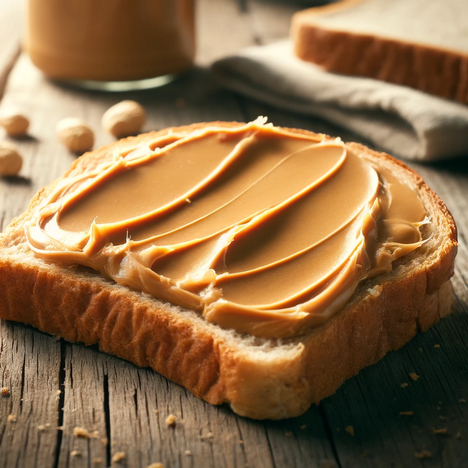Peanut butter

What is peanut butter?
Peanut butter is made by grinding roasted peanuts into a paste. The result is a creamy or chunky butter that is rich in protein, fats and various nutrients. While it is used in many households as a spread or ingredient in recipes, peanut butter has also won a permanent place in the hearts (and tummies) of many dogs.
A treat to be enjoyed with caution
Although peanut butter can offer many health benefits, it's important to follow some safety precautions before giving this snack to your dog.
Benefits of peanut butter for dogs
High protein content
Peanut butter is an excellent source of protein that can help build and maintain your dog's muscle mass. Proteins are essential building blocks for healthy body function.
Healthy fats
The fats in peanut butter are mostly unsaturated and can help lower blood cholesterol levels and support your dog's cardiovascular system.
Vitamins and minerals
Peanut butter contains important vitamins such as vitamin E, niacin and vitamin B6, as well as minerals such as magnesium, which can contribute to your dog's overall health.
Disadvantages and risks
Xylitol - A deadly ingredient
Some peanut butters contain xylitol, a sugar substitute that is highly toxic to dogs. Even small amounts can lead to hypoglycemia, liver failure and even death.
High fat content
Despite the health benefits of unsaturated fats, the high fat content in peanut butter can lead to obesity and pancreatitis if consumed in excess.
Allergies
Just like humans, dogs can also be allergic to peanuts. Watch your dog closely for signs of an allergic reaction, such as itching, swelling or breathing difficulties.
Safety instructions and recommendations
- Choose xylitol-free products: Make sure the peanut butter you give your dog does not contain xylitol.
- Moderation is key: Only give peanut butter in small amounts as an occasional treat.
- Quality matters: Choose high quality peanut butter, preferably with no added salt, sugar or other additives.
Peanut butter can be a healthy and tasty addition to your dog's diet as long as it is given responsibly and in moderation. Be sure to choose xylitol-free products and monitor your dog for possible allergic reactions. With these precautions, you can give your furry friend a treat without putting their health at risk.
If you notice any signs of hypersensitivity or poisoning in your dog, you should see your vet immediately. We are not a substitute for a vet, but we try to be as accurate as possible. Every dog reacts differently and we recommend you get a second opinion or consult your vet if in doubt.
Stay healthy and take good care of your four-legged friend!😊